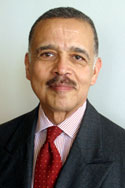ARCHIVES
OF EDITORIALS
January 22, 2004
Unfinished business
Martin Luther King is honored all over the world
as the most prominent advocate of non-violent social change since
Mohandas Gandhi. Among African Americans, King is revered for
his successful leadership of the civil rights movement. However,
few remember the drive to end poverty that King had launched shortly
before his death.
King’s great achievements were the non-violent demonstrations
for equal rights that aroused the conscience of the nation. The
brutal retaliation of the hardcore bigots revealed to the world
the racial hypocrisy of America. President Lyndon Johnson signed
the Civil Rights Act of 1964 that made it a federal offense to
discriminate in education, employment or places of public accommodation
on the basis of race. In 1965, the president signed the Voting
Rights Act that provided federal protection in areas of the South
where blacks were prevented from voting by force or threats.
Disingenuous conservatives have insisted that blacks were freed
from slavery by the 13th Amendment to the U.S. Constitution in
1865 and any additional legislation or programs to assist them
are unnecessary. That opinion fails to recognize that there has
been a concerted effort in America since then to marginalize the
status of blacks. The first argument was that the freed slaves
were not citizens. In 1868, Congress had to settle that question
with passage of the 14th Amendment, which states, “All persons
born or naturalized in the United States … are citizens
of the United States and of the state wherein they reside.”
Then Congress passed a Civil Rights Act in 1883 to provide equal
access to places of public accommodation, but that had limited
effect because of the states’ rights interpretation by the
U.S. Supreme Court. Also, the decision in Plessy v. Ferguson in
1896, which sanctioned the doctrine of separate but equal, vitiated
the effectiveness of that Civil Rights Act.
For a whole century from the end of slavery African Americans
fought in the courts for equality. Notable victories include Shelley
v. Kraemer (1948) outlawing restrictive covenants on the sale
of real estate, and Brown v. Board of Education (1954), which
reversed the legality of the “separate but equal”
doctrine in Plessy v. Ferguson, and ended de jure discrimination
in public schools.
As a result of Martin Luther King’s efforts, changes in
the country’s laws provide for the first time reason to
assert that African Americans are finally free. There has been
less than 40 years of freedom not the 139 years from the end of
slavery.
Martin Luther King realized that freedom would be meaningless
unless blacks could attain a reasonable measure of economic equality.
He was especially concerned about the plight of the poor. King
said:
“There is nothing new about poverty. What is new is that
we now have the techniques and the resources to get rid of poverty.
The real question is whether we have the will.”
At the end of his life, King was thoroughly committed to the Poor
People’s Campaign. He was in Memphis helping the garbage
collectors get an increase in pay when he was assassinated.
United For a Fair Economy, an organization in Boston that studies
economic inequality, has recently published an analysis of the
economic condition of African Americans from 1968 to the present.
It is clear that much has to be done to realize King’s dream
of freedom and equality for all.
Home
Page

